

About HKJC
HKFA Partnership >
Football Fitness >
In Their Words
Develops the physical, mental and social capabilities of young people and fosters an attitude of excellence
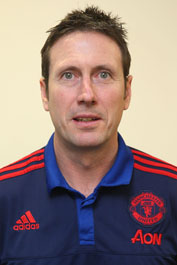
Tony Strudwick
Head of Fitness and Conditioning, Manchester United
CHANGING ROLE OF SPORTS SCIENCE IN ELITE FOOTBALL
On behalf of Manchester United Football Club, we are delighted to be supporting The Jockey Club Youth Football Fitness Assessment, a ground-breaking initiative that will have a major influence on the identification, selection and development of young talent.
Contemporary sports science is making a significant impact around the world on the movement towards systematic methods of preparing elite football players for competition. Indeed, coaches have been exposed to scientific approaches for preparing teams and individuals for competition. In general, teams that have adopted a strategic approach have been rewarded with success by gaining an advantage over their competitors.
This shift has facilitated more informed practitioners working with teams, stronger links with scientific institutes, and more coaches willing to accept the changing role of sports science in elite football.
This is why The Jockey Club Youth Football Fitness Assessment is such an important initiative.
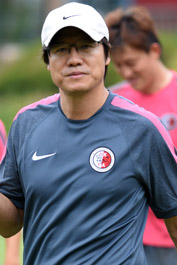
Kim Pan-Gon
Head Coach, Hong Kong Representative Team
Proper Approach on Youth Development
Hong Kong Representative Team head coach Kim Pan-gon believes targeted and tailored training programmes, supported and designed using data, are essential to laying the foundation for young players to develop into professionals.
"Physical conditioning is one of the most important parts to winning the game. Without it, we cannot use our technical skills nor expect to be mentally strong," Kim explains. And he should know, having coached the Hong Kong Team to their historic 2009 East Asian Games gold medal triumph.
South Korean Kim’s ties to Hong Kong run deep. It was here that he finished his playing career, and currently he is enjoying his second spell in charge of the Representative Team. Recently, he oversaw the encouraging joint qualification campaign for the 2018 FIFA World Cup and 2019 AFC Asian Cup.
"If we don’t have a proper approach to developing our young players’ physicality, it will be more difficult to do so when they turn into seniors," Kim says.
"We will use this data, and we want to also establish our own physical conditioning programme for each age group, so that our players can see progressive development."
Kim, a former coach of the Hong Kong National Academy, is a keen supporter of the Jockey Club Youth Football Fitness Assessment.
"We are happy with this programme and want to see it spread out to all the districts and the schools so that everybody can have the chance to improve their physicality and reach their football goals," adds Kim.

Dr. Patrick YungDeputy Director, The Hong Kong Jockey Club Sports Medicine and Health Sciences Centre
Benchmark for Self Progression
Sports science is making a major impact around the world in how athletes are being trained and coached. In pursuit of the highest performance, it is essential to assess athletes’ physical profiles and attributes for benchmark setting, which then enables targeted training programmes.
Leading the way in Asia is The Jockey Club Youth Football Fitness Assessment, a groundbreaking project that covers subjects from each and every youth age group. The assessment allows coaches to understand where players stand against local benchmarks and in comparison to other nations, and also highlights developmental differences in each of four football-specific physical capabilities.
The availability of these statistical figures not only provides players with cognitive information about their athletic strengths and weaknesses, but also individual parameters for coaches to assess training efficiency in an objective manner. This fosters a better understanding between coaches and players, and puts them on the same page towards reaching their specific goals.
We are delighted to have had the opportunity to work with The Hong Kong Jockey Club, Hong Kong Football Association, Manchester United Football Club, and Hong Kong Sports Institute in supporting local youth football development through this project. We look forward to following the trajectory of our local athletes as they use the database with their coaches to reach their higher goals.
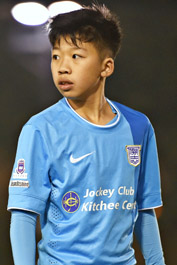
Anson Wong2015 Jockey Club Youth Football Skills Challenge Winner
Once You Are Satisfied, you Will Stop Improving
Anson Wong, the 2015 HKJC Youth Football Skills Challenge winner and current Kitchee midfielder who trains six times a week, was invited by the Hong Kong Football Association to be one of 537 subjects to be part of the Jockey Club Youth Football Fitness Assessment.
"Players from other countries are usually much stronger," Wong says. "They are quicker and jump much higher than us." Having seen first-hand the difference in standard when comparing himself to others, the now 14-year-old is determined to use the assessment findings to improve himself as a player. "For a midfielder, agility and recovery are most important as the ball is always going up and down and left to right," adds Wong.
"You need lots of stamina to keep running back and forth throughout the whole game without much rest. These tests show how much endurance you have."
Wong is well aware of the importance of continuous improvement. "You should never be satisfied with the results, or you will stop improving and your ability will fall further behind everyone else," says Wong. Wong is an avid supporter of the Hong Kong team and hopes to use the results from the tests to continue to progress through the age groups and be in a position to pursue football as a career.
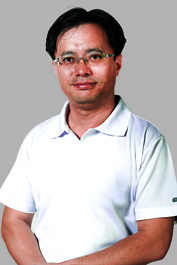
Dr. Raymond SoDirector, Elite Training Science & Technology, Hong Kong Sports Institute
A Marginal Difference to Achieve Victory
With the margin between winning and losing in top-level professional sports often decided by milliseconds, Hong Kong Sports Institute Director of Elite Training Science and Technology Dr. Raymond So has urged for a full roll out and implementation of an assessment-based training approach.
Dr. So has worked for the Hong Kong Sports Institute for 30 years and was invited to join The Jockey Club Youth Football Fitness Assessment as Technical Advisor.
"In Hong Kong, there is a long tradition of people playing football. Many believe that to improve your level you must do more skills training, play more games, and enter more competitions so that you have more time on the field, but that is not necessarily what modern football requires." says Dr. So.
"Physical fitness, cardiovascular strength and muscle power are very important to athletic competence and skills. Testing is the only way to answer how these elements contribute to success in football and whether players’ performances are improving.
"Without testing and its resulting data, we can only produce ballpark training numbers. This is not enough for athletes at the elite level, as you are often talking about a 100th of a second difference, hence individual training adaptations are important."
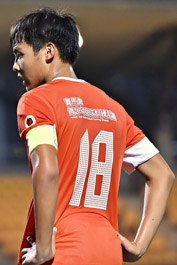
Clive Ng2015 Jockey Club Youth Football Skills Challenge Winner
We Understand where We Stand and What Needs to Improve
Results from The Jockey Club Youth Football Fitness Assessment show that youth players in Hong Kong are behind UK-based players. Clive Ng, who was given the opportunity to train at the Manchester United Academy after winning the 2015 Jockey Club Youth Football Skills Challenge, defied these results by breaking the record for the vertical jump at the renowned Manchester United training base. "Breaking the record motivates me as I know I can do well," says Ng.
Hong Kong U-15 defender also took part in The Jockey Club Youth Football Fitness Assessment. "All testing items are essential components when playing football," adds Ng. "We now understand where our ability stands and what aspects we need to improve while we are still young.
"I am not tall for a defender, thus working on my vertical jumping ability would certainly improve my game. However, I believe all of us should work harder on our endurance capacity so we can play better and stay in the game longer." Ng has his sights set on progressing through the ranks within the Hong Kong system, which will benefit from the results of The Jockey Club Youth Football Fitness Assessment, as the Hong Kong Football Association will be using the data to further develop youth training and structured progressive training frameworks for the benefit of coaches and players.
"Hong Kong is not one of the strongest teams, so I want to help improve our ranking and achieve more." says Ng.
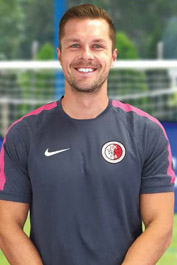
Mathew PearsSpecialist Conditioning Coach, Hong Kong Football Association
Data is Gold Dust
When Mathew Pears walked through the doors at the Hong Kong Football Association to start his new job, the Specialist Conditioning Coach was delighted at being handed the results from The Jockey Club Youth Football Fitness Assessment.
Containing the data of local players aged between 13 and 17 over a three year period, the assessment gives Pears an invaluable insight into the physical level of Hong Kong’s youth football players. "The data is gold dust. It gives me a step forward to benchmarking and developing further data," says Pears. "I’ll also compare it against data from UK clubs and from Asian countries to see how fit we are and see if we are in a position to compete with those around us."
With his role supported by the "Jockey Club HKFA 5-Year Development Programme," Pears arrived in Hong Kong at the start of January 2016, following just under eight years with Leeds United in England. Having worked with a team that plays in the physically demanding second-tier of the English League Championship, Pears is looking to build a solid basic foundation aimed at improving performance.
"Testing is pivotal; testing is what we use to evaluate our interventions and see if what we are doing is working and to make sure our players are going in the direction we want them to go," adds Pears.
Subjects And Methodology
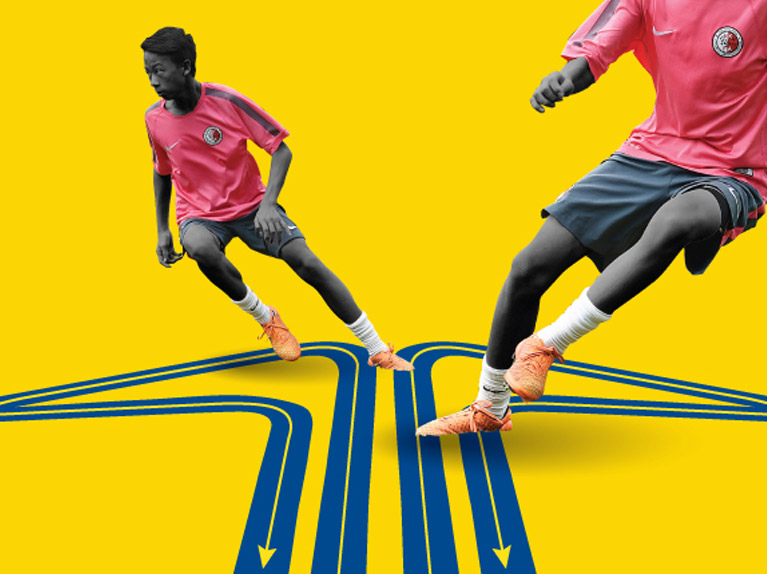
Over the past three years, more than 600 male players, all aged between 13 and 17, were enrolled as subjects of this pioneer project.
Youth Football Fitness Benchmark
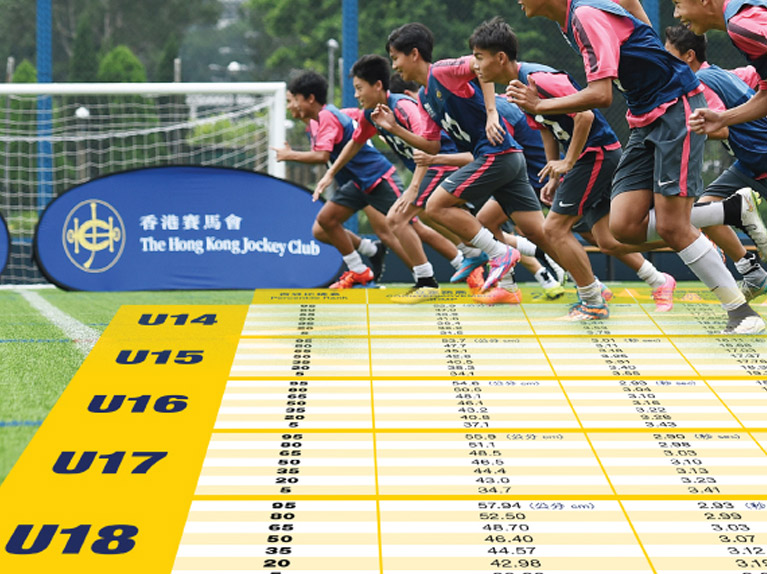
Besides establishing the first-ever fitness database on local youth players, the findings also enable HKFA to undertake successive analysis and make the information.
In Their Words
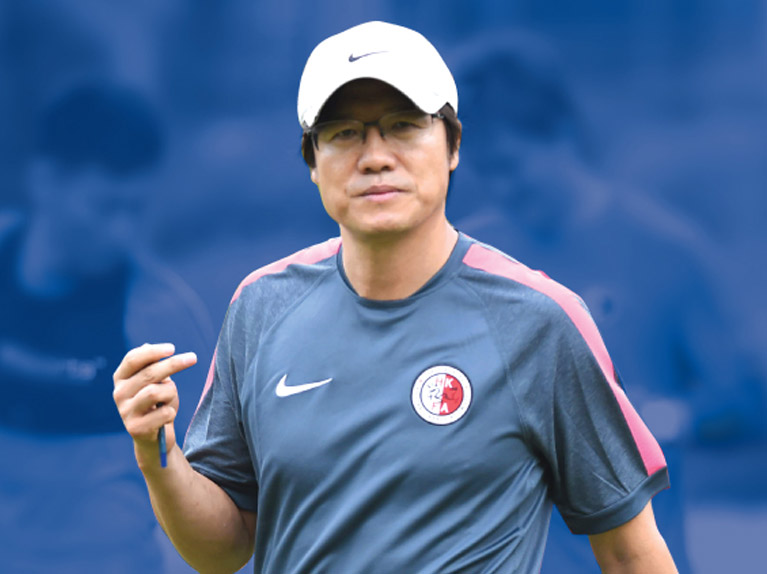
Read what the professional, participants and players think about the programme.
HK Players Comparison

HK youth team players are more experienced than district league players.
HK/UK Comparison
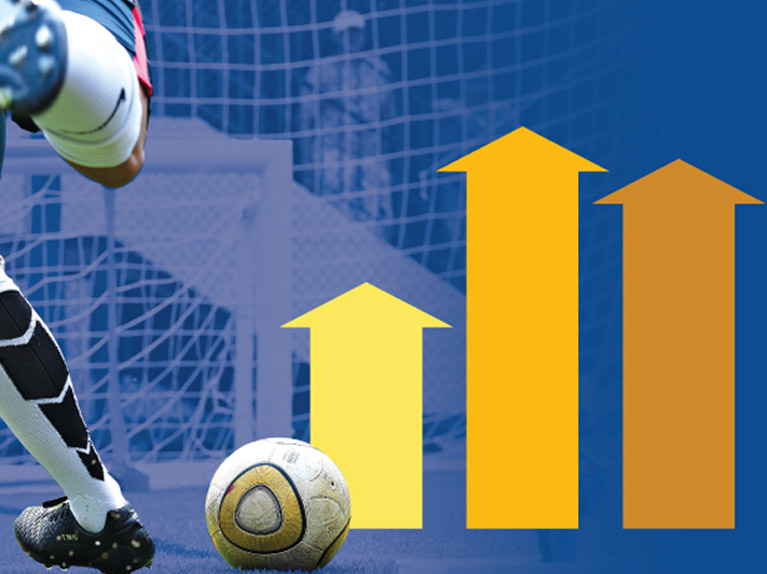
The muscle power and aerobic endurance, as indicated by the Countermovement Jump Test and Yo-Yo Intermittent Test results, of Hong Kong youth team players were lower than their counterparts in UK.


